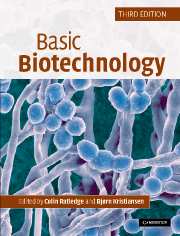Book contents
- Frontmatter
- Contents
- List of contributors
- Preface to the second edition
- Preface to the third edition
- Part I Fundamentals and principles
- Part II Practical applications
- Chapter 12 High-throughput screening and process optimisation
- Chapter 13 The business of biotechnology
- Chapter 14 Amino acids
- Chapter 15 Organic acids
- Chapter 16 Microbial polysaccharides and single cell oils
- Chapter 17 Environmental applications
- Chapter 18 Production of antibiotics by fermentation
- Chapter 19 Strategies of cultivation
- Chapter 20 Enzyme biotechnology
- Chapter 21 Recombinant proteins of high value
- Chapter 22 Insect and mammalian cell culture
- Chapter 23 Plant cell biotechnology
- Chapter 24 Biotransformations
- Chapter 25 Immunochemical applications
- Index
Chapter 20 - Enzyme biotechnology
Published online by Cambridge University Press: 05 June 2012
- Frontmatter
- Contents
- List of contributors
- Preface to the second edition
- Preface to the third edition
- Part I Fundamentals and principles
- Part II Practical applications
- Chapter 12 High-throughput screening and process optimisation
- Chapter 13 The business of biotechnology
- Chapter 14 Amino acids
- Chapter 15 Organic acids
- Chapter 16 Microbial polysaccharides and single cell oils
- Chapter 17 Environmental applications
- Chapter 18 Production of antibiotics by fermentation
- Chapter 19 Strategies of cultivation
- Chapter 20 Enzyme biotechnology
- Chapter 21 Recombinant proteins of high value
- Chapter 22 Insect and mammalian cell culture
- Chapter 23 Plant cell biotechnology
- Chapter 24 Biotransformations
- Chapter 25 Immunochemical applications
- Index
Summary
Introduction
Society is facing a number of key socio-economic and environmental challenges: global warming, extinction of species in key ecosystems, malnutrition, shortages of water and other natural resources. All of these are human-made problems, and they require innovative solutions. While precious natural resources continue to dwindle, the number of consumers and polluters is growing. A major challenge for the future is development of products that are less hazardous, pollute less and require less energy. It is here that enzymes can make an impact on the future of society. In 1878, Kühne coined the term ‘enzyme’ from the Greek enzumos, which refers to the leavening of bread by yeast. However, the modern term refers to biological catalysts in the form of globular proteins that facilitate chemical reactions in the cells of all living organisms. Enzyme-catalysed reactions take place under relatively mild and ecologically friendly conditions, are highly specific and greatly accelerate the rates of the reactions in which they participate. Enzymes make better use of raw materials, save water and energy, and often replace toxic chemical processes. For example, the enzymes from bacteria and fungi in forest litter are primarily responsible for the breakdown of decaying plant biomass and, thus, they are critical in the recycling process we recognise as the global carbon cycle. These microbial enzymes may one day be harnessed to convert waste plant materials, such as corn stover, straw and grasses, into fuel and simple carbon compounds used for the synthesis of chemical and pharmaceutical intermediates, thereby decreasing our dependence on petroleum-based carbon.
- Type
- Chapter
- Information
- Basic Biotechnology , pp. 477 - 498Publisher: Cambridge University PressPrint publication year: 2006
- 7
- Cited by

